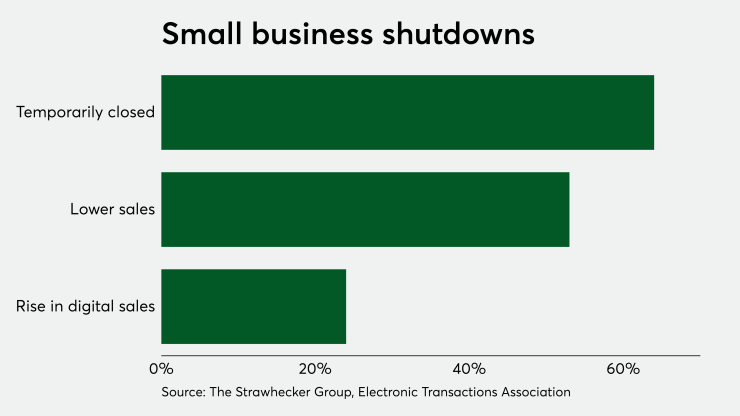The coronavirus outbreak is still very much an economic crisis, but that doesn't mean the best solution is to keep on selling.
What merchant acquirers do now will have a lasting impact later. And that means less selling to already stressed businesses.
“It’s really about finding an alternative method to do things,” said Doug Mearkle, Head of U.S. merchant services sales at TD Bank, in a recent interview in which he also discussed the
In payments, alternatives could mean not requiring face-to-face interactions for things that had typically been done in person, Mearkle said. “The merchants want to know how to do online ordering. They’ve done phone ordering, but how does that work now? How do you do delivery and avoid walking in crowds?”
Much of the fintech and bank response has focused on getting funding to merchants and other small businesses that face liquidity problems due to closers or tighter operating restrictions. One of the main venues for this is the Paycheck Protection Plan, which the

There have been other forms of aid, such as crowdfunding and a
But as fintechs and banks address credit and funding gaps, they’re also trying to address other problems such as business operations, invoicing, or not requiring small businesses to physically interact with their bank or acquirer.
TD Bank has been accumulating crisis-related feedback and requests from small businesses over the past several months, and has found general safety concerns dominate. Firms are worried about both funding and the virus — and want details about how workarounds such as mobile ordering and “curbside” pickup work in practice.
"A lot of restaurants, for example, may have posted a menu online but they didn’t have ordering,” Mearkle said. “It goes back to trust. How do I make customers feel?”
As a result, the bank is relying more on its Clover integration, enabling merchants to add features they may not have used before. There are underutilized technology assets such as tying transactions to general content, Mearkle said.
Fintechs and banks have battled for the past few years to capture small businesses, with fintechs offering faster access to credit and quick onboarding to accept digital payments — taking share from banks that had traditionally underserved the sector. As businesses struggle with liquidity during the coronavirus crisis, banks have an opportunity to recapture some of that share by focusing on relationships as part of merchant acquiring, particularly at the local level.
“Local lenders in particular, such as community banks and credit unions, will have a local presence and expertise that can help them interact with small businesses,” said Austin Kilgore, director of digital lending at Javelin Strategy & Research.
Since thousands of businesses have been closed for up to three months — and consumers are concerned about shopping — the main concern for merchants is getting people to come back to the stores, returning to a mix of online and brick and mortar shopping. Payments and financial service technology has to exist within that mindset, Mearkle said.
The pressure is on lenders to use an API integration that connects the merchant's payment rail, accounting and the borrower’s platform to ensure creditors mitigate risk, said David O’Connell, a senior analyst with Aite’s Wholesale Banking team.
This technology exists, and most fintech lenders offer it as part of underwriting that ties lending to past payment flows. PayPal and
The integration of payments, accounting and credit at small businesses was considered “cutting edge” up to two months ago but is quickly becoming mainstream, O’Connell said.
“As these borrower relationships are being renewed and terms are renegotiated, there will be much more of these integrations,” O’Connell said, adding the combination of payment, accounting and lending integrations needs to occur without heavy cross-selling, but more as a way to strengthen the relationship between the merchant acquirer and the business. “Small businesses want to know their lender is taking care of them and not trying to sell the latest fad.”





